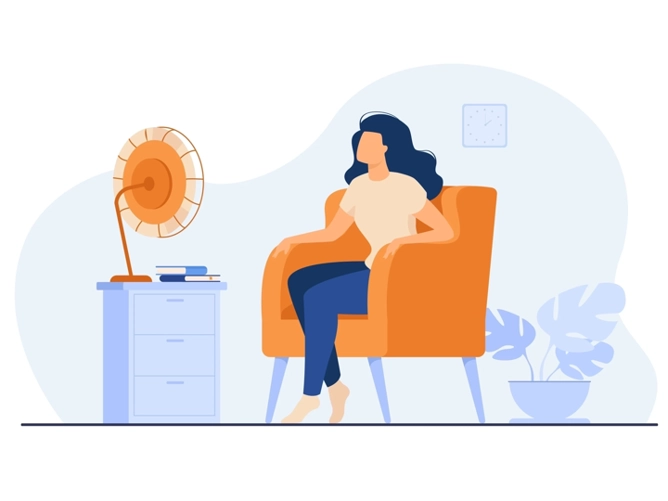
Heating in Germany - All You Need To Know [2026] - Live In Germany
Are you living in Germany or planning to move to Germany for a permanent stay? Do you need to install a new heating source at your home or apartment? Are you well aware of the German heating law? Do you feel cold and want an efficient heating system at your place? This guide is a perfect read if you are looking for heating-related information. This article will explain the roadmap for sustainable heating options in Germany. Let us get started.
Need an Electricity Provider?
Check out our detailed article on Best Electricity Provider in Germany.
Overview of Germany’s Controversial Heating Law (Heizungsgesetz)
The controversial Heizungsgesetz (Heating Law) was introduced and drastically altered Germany’s heating environment. A compromise between different political forces resulted from this law becoming the centre of considerable discussion and political manoeuvring.
Approval and Voting Through Habeck’s Heating Law
With 399 votes in favour and 275 against, Germany’s coalition government passed Habeck’s Heating Law after months of internal disputes and concessions. The goal of the law is to gradually replace home heating systems that run on fossil fuels by mandating a minimum of 65 percent renewable energy consumption. This legislative action is consistent with Germany’s goal of attaining national carbon neutrality by 2045.
Connection to Germany’s Climate Neutrality Goal by 2045
A significant step toward Germany’s ambitious aim of becoming climate-neutral by 2045 is the passage of Habeck’s Heating Law. Even after being approved, the law’s path has been characterised by concessions and public conflicts, which raises concerns about how well it will work to meet international climate targets like those stated in the Paris Agreement.
The Heizungs Gesetz: Key Provisions and Timeline
Being an expat in Germany, you must clearly understand the timeline, provisions, and developmental and practical changes in Germany’s heating law. In this section, we have explained the changes in the heating law and shared the implementation timeline, too, so you may know about it in a better way.
Development and Changes in the Heating Law
Germany’s heating law, the Heizungsgesetz, has changed significantly since Greens Minister Robert Habeck first proposed it in March 2023. Though it started as a simple concept, the law became the focus of heated public discussion and concessions between opposing political parties. The modifications show how difficult it is to balance environmental objectives and financial concerns.
Implementation Timeline
All laws are implemented when the respective authority approves them. Here is the approval and effective date for the Heizungsgesetz heating law in Germany.
Bundesrat Approval
The Bundesrat’s adoption of the measure is pending and is anticipated to happen in late September. The law can only take effect once the Bundesrat approves it.
Effective Date: January 1, 2024
The Heizungsgesetz is scheduled to go into effect on January 1, 2024, assuming approval by the Bundesrat. This is a turning point for the country’s heating systems and paves the way for a slow shift to renewable energy.
Permitted Repairs and Installations Post-January 1, 2024
Repairs to Fossil Fuel Systems
Fossil fuel-based energy systems that are still operational can be repaired and used beyond January 1, 2024. Only when the current method stops working will replacement with renewable energy technologies become required.
Installation of New Gas Heaters
Remarkably, the law allows the installation of new gas heaters after January 1, 2024, provided they may be converted to renewable energy. This adaptability recognises that about half of Germany’s buildings still have fossil fuel heating systems.
Impact on Renters
The German heating law has a significant impact on renters in specific given scenarios.
Subsidies for Renewable Heating Systems
The government provides subsidies to encourage the switch to renewable heating systems, paying 30% of installation expenses or 60% for those with lower incomes. An extra 20% subsidy is given to early adopters through 2028, which increases the switch’s financial appeal.
Criteria for Subsidies
Here are the criteria for subsidies given by the government. Additional incentives are also offered for early adoption by 2028.
Government Subsidies for Installation Costs
The government might subsidise 70% of the installation costs for households. This promotes a steady transition to renewable energy sources.
Additional Incentives for Early Adoption (Until 2028)
The law encourages the quicker adoption of sustainable heating solutions by offering other incentives to individuals who install renewable systems before 2028.
Caps on Subsidies and Affordability
Subsidies provide monetary assistance, but limits are in place to guarantee appropriate use. Each home can receive the highest amount of contributions to pay installation costs, which is 70%.
Responsibilities of Landlords
Landlords must install the new heating systems, and those who get subsidies are only allowed to charge renters a maximum of 10% of the unpaid installation expenses.
Rent Increase Limitations Post-System Installation
The law restricts rent increases after system installation to stop exploitation. Any increase is subject to additional limitations if it surpasses 30 percent of the total household income, with a cap of 50 cents per square meter.
Overview of Heating System Trends
Germany, a leader in environmental regulations, is experiencing a revolution in heating systems. To fight climate change, there is a growing emphasis on switching to renewable energy sources and minimising dependency on fossil fuels.
Germany’s heating landscape is changing quickly due to the country’s ambition to be carbon neutral. The government’s commitment to replacing heating systems that rely on fossil fuels with ones that use at least 65% renewable energy is demonstrated by recent legislative revisions. By 2045, the Heizungsgesetz seeks to establish national climate neutrality.
Dominant Heating Sources in New Homes
Natural Gas
Natural gas is still a popular option; in the previous year, 49.8% of newly constructed residences had it installed. Compared to conventional fossil fuels, it provides efficiency and lower carbon emissions.
Heat Pumps
Heat pumps are becoming increasingly common; 19.9% of new installations use them. This technology can extract heat from the ground or the air, making heating more sustainable and clean.
District Heating Systems
District heating systems are an example of a centralised approach used in 21.5% of new dwellings. They frequently use renewable energy from a single source to heat numerous buildings.
Decline of Oil-Fired Boilers and Emerging Technologies
Growth of Heat Pumps
The sharp rise in heat pump technology coincides with the fall in oil-fired boilers, which accounted for just 0.7% of all boilers in 2014. Heat pumps increased market share more than 50% in 2022, indicating consumers’ increased inclination toward more environmentally friendly options.
Changing Trends in District Heating Systems
Over the past ten years, the percentage of homes using district heating systems has nearly quadrupled (2021: 14.1%), indicating a move toward more centralised and environmentally friendly heating options.
Impact on Housing Stock and Modernization Efforts
Germany has 38.4 million dwellings; these trends significantly affect the country’s total housing supply. Government incentives and modernisation efforts push homeowners to replace their heating systems to maximise efficiency and minimise environmental impact.
Adapting to the Changing Landscape: Homeowner Initiatives
Funding Support for New Heating Systems
Through several financial programs, homeowners are urged to upgrade to energy-efficient systems. KfW’s ‘Energy-efficient retrofitting’ plan has offered a 10% subsidy for energy-efficient, contemporary oil-fired or gas condensing boilers from August 1, 2015. Systems using renewable energy can get more investment.
Importance of System Upgrades
Even though replacing heating systems can be expensive initially, homeowners will find that the long-term advantages — such as cheaper heating bills and a more minor environmental effect — make the investment worthwhile.
Understanding Tenant Rights in Germany
Understanding tenant rights in Germany is essential for everyone so that you may be safe in the future.
Heating Period Regulations
Germany’s renters benefit from laws that specify the “Heizperiode,” or heating season, which runs from October 1 to April 30. Landlords are required to keep minimal temperatures during certain hours to protect the health and comfort of their tenants.
Landlord Responsibilities under the New Law
According to the new heating law, landlords are now accountable for implementing renewable energy-based heating systems. Renters’ financial burden can be reduced by passing on some of the subsidies that landlords receive.
Practical Tips for Efficient Heating in Germany
Efficient heating benefits you in all aspects, so here, we have mentioned a few practical tips you can follow for effective heating at your place.
Correct Usage of Thermostats
It is essential to comprehend thermostat operation to achieve effective heating. Thermostat numbers do not indicate heating power; instead, they indicate desired temperatures. Energy savings are facilitated by maintaining thermostat settings at desirable values and preventing pointless raises.
Importance of Ventilation
Proper ventilation is crucial to maintain indoor air quality and prevent mould growth. Ventilation through fully opened windows is more efficient for a brief period than ventilation through tilted windows. It is advised for homeowners to ventilate when brushing their teeth to maintain daily schedules.
Preventing Mould Formation
Mold development can be largely avoided by using efficient heating and ventilation systems. It is recommended that homeowners keep their homes at warmer temperatures and remove any clutter from near external walls to reduce humidity and create a healthier living area.
Tenant Rights and Regulations
Heating Period and Temperature Standards
Heizperiode and Minimum Temperatures
The “Heizperiode,” or heating season, usually lasts from October 1 to April 30 in Germany. Landlords must keep the interior temperature at a minimum during this time to protect renters’ health. Residential properties are required by law to keep living areas at a minimum temperature of 20 degrees Celsius (68 degrees Fahrenheit).
Exceptional Cases for Early Heating
Landlords are allowed to turn on the heating sooner in rare circumstances where the temperature drops considerably before the official start of the heating season. This clause shields renters against freezing weather and recognises the need to maintain a suitable living environment.
Tenant Rights Regarding Heating and Hot Water Supply
Consequences for Landlords if Standards Aren’t Met
German law gives specific definitions to tenants’ rights about heating. If a landlord doesn’t follow the rules, there could be repercussions. During the Heizperiode, tenants are entitled to appropriate heating; if the landlord fails to provide it, tenants may pursue legal recourse. Landlords may face fines, legal concerns, and maybe having to pay renters for discomfort or health problems brought on by insufficient heating.
Furthermore, if heating requirements are not fulfilled, German rental legislation frequently permits renters to withhold payment or cut it proportionately. This provides landlords with solid motivation to emphasise the upkeep and effectiveness of their heating systems.
Understanding German Radiators and Heating Systems
Radiator Types
Panel Radiators
Often seen in German homes, these smooth, flat radiators effectively disperse heat in a space equitably.
Underfloor Heating
Warm water is circulated through pipes beneath the floor to give regular warmth, making it a popular option for new construction.
Central Heating Systems
Central heating systems, which provide a complete heating solution for entire buildings, are frequently fueled by natural gas, oil, or renewable energy sources.
Energy-Efficient Technologies
Condensing Boilers
These boilers, which are very common in Germany, enhance energy efficiency by taking up surplus heat from the combustion gasses.
Smart Heating Controls
Integrating digital controls and smart thermostats makes precise temperature control and optimal energy use possible.
Proper Use of Thermostats
Programmable Thermostats
Scheduling
Germans strongly emphasise the necessity of scheduling heating to coincide with everyday activities to reduce wasteful energy use.
Zoning
Using zoning systems, you may customise the heating to certain areas, saving energy in unoccupied spaces and giving warmth where needed.
Temperature Settings
Recommended Temperatures
Knowing the optimal temperature settings for various living areas guarantees energy efficiency and comfort.
Night-Time Reduction
Not only can lowering the temperature throughout the night save energy, but it also improves sleep quality.
Winter Preparation: Home, Car, and Self
Home Preparation
Efficient Heating Practices
Germany is renowned for its dedication to sustainable environmental standards, which includes heating methods. Most German homes have central heating systems, which frequently use energy-saving technologies. Boilers that run on gas or oil are standard, and modern buildings often incorporate renewable energy sources like heat pumps or solar panels. Regular maintenance is essential for heating systems to operate at their best during the winter. It is typical for locals to arrange for expert examinations before the arrival of the winter months.
Insulation, Seals, and Programmable Thermostats
Germans prioritise sealing and insulation to keep heat in their homes during the bitter cold. In contemporary architecture, double-glazed windows, insulated walls, and roof spaces are conventional elements. Energy efficiency is enhanced with programmable thermostats that allow for exact temperature control and weather stripping around windows and doors to minimise drafts. The German government offers financial incentives to homes that invest in energy-saving technologies to promote a sustainable lifestyle.
Car Preparation
Winter Tyres, Snow Chains, and Antifreeze
Winter tires are advised and legally required in Germany during the colder months. The purpose of these tires is to improve traction on snowy and icy roadways. Snow chains are also advised in some localities, particularly those with mountains. The car’s radiator must be filled with antifreeze to keep the engine from freezing. Drivers often convert from summer to winter tires in October and around Easter.
Battery and Lights Check
An automobile’s battery may be negatively impacted by cold, which lowers battery efficiency. It’s advised to regularly assess the battery’s health and charge to prevent unplanned malfunctions. Furthermore, it’s imperative for visibility in winter conditions that all lights, including brake lights, taillights, and headlights, are in operational order.
Personal Preparation
Importance of Vitamin D and Sun Exposure
The shorter days of the German winter can cause a Vitamin D deficiency, hurting general health and well-being. Germans address this by stressing the value of sun exposure. Spending time outside, even in cold weather, is recommended, as are going for short walks during the day to maintain vitamin D levels.
Dressing Appropriately for German Winters
During the winter, it’s essential to dress appropriately. Germans are renowned for their fashionable yet functional winter wardrobe, which frequently consists of hats, gloves, scarves, and insulated jackets. People often layer their clothing to adapt to shifting climates. High-quality footwear, incredibly waterproof and insulated boots are essential for navigating icy and snowy streets.
Emphasising Sustainable Heating Practices
The Heizungsgesetz anchors Germany’s emphasis on sustainable heating techniques. The government promotes eco-friendly heating systems by providing financial assistance to homeowners and incentives for switching to renewable energy sources. The subsidies balance economic considerations with environmental concerns and are capped to ensure responsible use.
Incentives and financial support for system upgrades are examples of homeowner activities that are critical to the effective adoption of sustainable heating methods. System modifications’ significance is emphasised, focusing on the long-term advantages of lower heating costs and environmental effects.
Beyond merely changing laws, efforts to gradually phase out fossil fuel-based heating systems also involve providing helpful advice on heat efficiency. Energy savings and healthy living conditions are facilitated using thermostats correctly, getting enough ventilation, and implementing mold prevention techniques.
Navigating the Transition Period and Adapting to New Regulations
To successfully navigate the transition phase, landlords and tenants must be aware of the implications of the Heizungsgesetz. Subsidies for renewable heating systems are intended to alleviate the financial strain on homeowners, and restrictions on rent hikes and landlord obligations guarantee a just transition for tenants.
Homeowner initiatives must use available subsidies and incentives for system modifications to comply with the new rules. A seamless transition depends on the tenant’s understanding of their rights, particularly the new law’s requirements for heating periods and the landlord’s obligations.
The result highlights the significance of effective heating techniques, insulation, and appropriate car preparation as Germany prepares for winter. Germans prepare for winter comprehensively, not only for their homes but also for their cars and personal health, emphasising how they face the difficulties of the chilly months.
Conclusion
Germany’s dedication to climate neutrality is demonstrated by the development of the country’s heating landscape, which was highlighted by the introduction and adoption of the contentious Heating Law (Heizungsgesetz). Robert Habeck led the coalition government’s vote to pass the law, which would gradually phase out fossil fuel-based heating systems. This goal aligns with Germany’s larger objective of becoming climate-neutral as a country by 2045.
One of the Heizungsgesetz’s main features is that home heating systems must use at least 65% renewable energy. The legislation reflects the difficulty of balancing environmental objectives and economic reasons by navigating a complicated terrain of concessions, arguments, and political scheming.
If approved by the Bundesrat, the law, scheduled to go into effect on January 1, 2024, will enable repairs to fossil fuel systems throughout this transition time. It will also allow for surprisingly flexible installation of new gas heaters. To promote a just and affordable transition, the impact on tenants is handled through subsidies, incentives, and restrictions on rent increases.
Natural gas, heat pumps, and district heating systems are the most common types of new installations in Germany’s heating systems, highlighting a paradigm change toward sustainability. The shift from oil-fired boilers to more environmentally friendly options indicates a desire to lessen the environmental impact.
To sum up, Germany’s Heating Law is essential to the country’s carbon-neutral goal. The delineated clauses, schedules, and effects on different stakeholders present a comprehensive approach designed to strike a balance between practical considerations and environmental objectives. The proper execution of this legislative endeavour, public awareness, and ongoing dedication to sustainable heating techniques are all necessary for its success.
So, this is it! We hope you are all transparent about Germany’s heating laws and practices. Have a safe and heated winter. Cheers!

Jibran Shahid
Hi, I am Jibran, your fellow expat living in Germany since 2014. With over 10 years of personal and professional experience navigating life as a foreigner, I am dedicated to providing well-researched and practical guides to help you settle and thrive in Germany. Whether you are looking for advice on bureaucracy, accommodation, jobs, or cultural integration, I have got you covered with tips and insights tailored specifically for expats. Join me on my journey as I share valuable information to make your life in Germany easier and more enjoyable.


![Best Apps to Learn German [Free + Paid]](https://liveingermany.de/images/best-app-to-learn-german/best-top-free-and-paid-learn-german-app-with-pros-and-cons.svg.webp-668w.webp)


